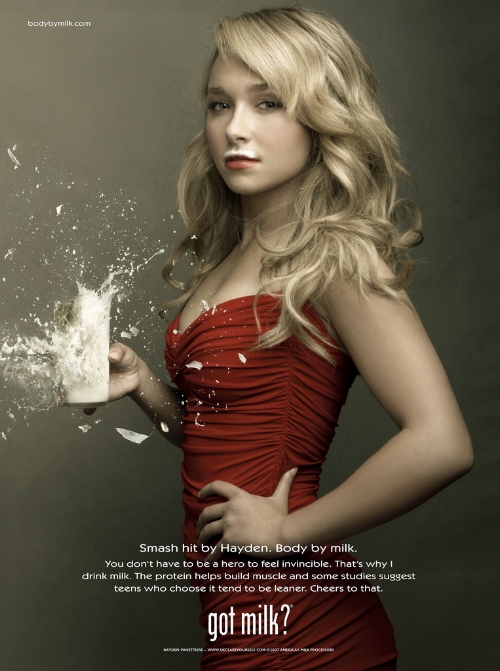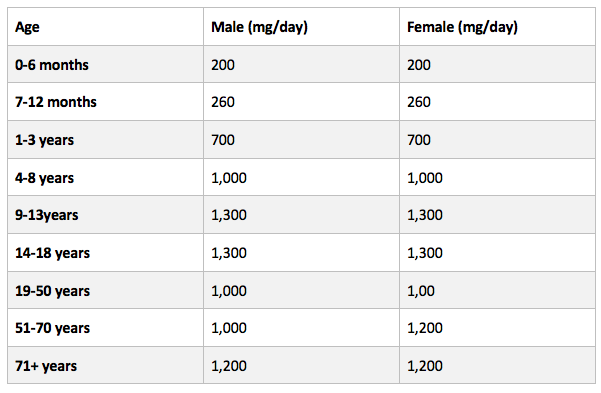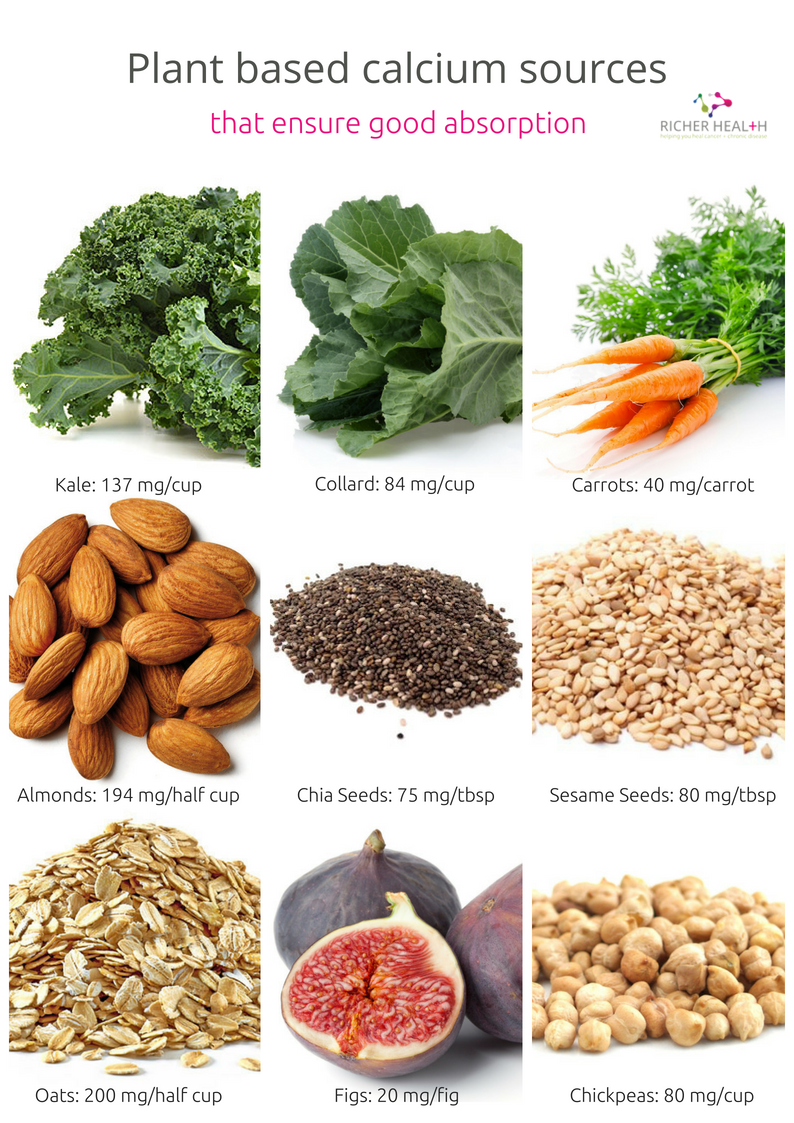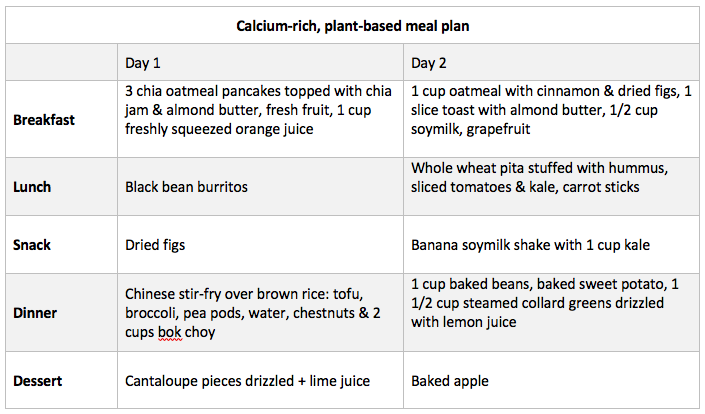June 17, 2019
“But… What about calcium”? – one of those one-liners you encounter every other day when you decide to fuel your body with plants only.
This question stems from the modern myth that dairy is the best and most reliable source of calcium. So let’s clear the air about calcium: Why does our body need calcium? How much do we actually need on a daily basis? What are the best plant-based calcium sources that get us there? And what about all the ‘other’ stuff that you get when eating plants instead of dairy?
The common belief that dairy = the ‘best’ source of calcium can be debunked in multiple ways.
“For years, the dairy industry has been telling us that dairy is the best thing for healthy bones, that kids need to drink cow’s milk, and that milk is nature’s perfect food. Actually, milk is nature’s perfect food for turning a 90-pound calf into a 450-pound cow in about 12 months.” – John Robbins

Photo Credit: Got Milk? Campaign
If the dairy myth was true, then think about this: why are the countries with the highest consumption of dairy products – Sweden, Finland, the U.S., and England – the same countries where osteoporosis* is at a peak level? According to the myth, these should be the countries where people have the strongest bones but in reality, the opposite is true.
Contrary to common belief, there are a plethora of plant-based calcium sources that are actually better than dairy in many ways. Plus, dairy production has many more detrimental environmental impacts than the production of plant-based food.
Let’s start with understanding why we need calcium in the first place.
Why does our body need calcium?
Most of us know that calcium has something to do with our bones. That’s correct! It is one of the building blocks of strong bones and teeth. Next to this, calcium is also a key player in the contraction of muscles (do not forget that our heart is a muscle too). Calcium is also interrelated with many vitamin D functions in the body, as it is for transferring signals from one cell to the other. Calcium stabilizes blood pressure, contributes to brain health and is essential for blood clotting (2, 4).
Needless to say: calcium is a very important mineral.
How much calcium do we need?
The amount of calcium you need to consume depends on how long you’ve been walking around on this beautiful planet we call Earth. Below, you can find the different RDAs* for calcium (1, 4).


Photo Credit: Arunas Naujokas via Unsplash
What are the best plant-based calcium sources?
To most people, these numbers might mean nothing at all, or only make this whole calcium discussion more confusing. We get you – don’t worry about these numbers too much. Although they are important, we agree, they are not really practical. That is why I have added both a list of some of the best plant-based calcium sources, as well as a sample two-day meal plan to easily reach that 1,000 mg/day goal. Hopefully these resources will help you realise that consuming an abundance of plant-based calcium can be quite effortless!
Because nature is so awesome and intelligent, we won’t need to turn to one plant only if we’re looking to eat calcium-rich food. There are an abundance of different plants that are deserving of the label ‘calcium-bomb’.
Examples include: collard, kale, broccoli, bok choy – another reason to never skip out on those leafy greens! An abundance of calcium can also be found in chickpeas, nuts (almonds and Brazil), seeds (chia, flax, hemp and sesame), soy, oats and dried fruit, such as figs. These are all fantastic calcium sources!

Would you like some cholesterol with that? Dairy comes with things you might not want.
Not only might dairy products release calcium from our bones, but calcium sourced from dairy products also comes with a plethora of other ‘ingredients’ that you might not want in your body, such as saturated fat, cholesterol, lactose, antibiotics and pesticides (3).
Plant-based sources of calcium, on the other hand, often tote an abundance of health benefits. To name a few: kale is ripe with powerful antioxidants; chia seeds are a fantastic source of essential fatty acids; almonds are rich with amino acids; figs are full of fibre… and the list goes on and on.
Makes you think twice about the message that the dairy industry has put out there, right? Good! There’s nothing wrong with being critical.
“It is time to unlearn what marketing, unfortunately, has made us believe.” – Simon J. Hill
To learn more about plant-based calcium and the dairy myth, I recommend listening to episode 296 of the Rich Roll Podcast.

Source: Physicians Committee for Responsible Medicine
*osteoporosis is a medical condition in which the bones become brittle and fragile from loss of tissue, typically as a result of hormonal changes, or deficiency of calcium or vitamin D.
If you enjoyed this blog, sign-up for our newsletter to receive future updates.
RESOURCES
- National Institutes for Health, Calcium: Fact Sheet for Professionals
- Functions of Calcium in the body
- Physicians Committee for Responsible Medicine
- Getting calcium on a plant-based diet and why you don’t need milk
- Eat Real Food Action Guide – John and Ocean Robbins
- veganmotivation.com
- My Food data: Top 20 vegetables high in Calcium
- Ask Dr. D’Adamo: Calcium level in plant-based food

Stephie Hennekam likes to think of herself as a knowledgeable foodie, wandering traveler, teacher, active yogi, lover of nature, free spirited writer & life long student. She loves going off the beaten path, following her (gut)- feeling and isn’t shy to try new stuff. After all, nothing beats experiencing something yourself.
As a former university college teacher, researcher, independent (sports)dietitian and jack of all trades at a vegan restaurant, she has now discovered her life goal of teaching & helping others to work towards a healthy, energised life filled with love, peace & happiness.

Comments